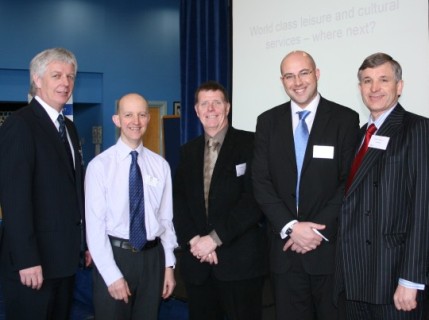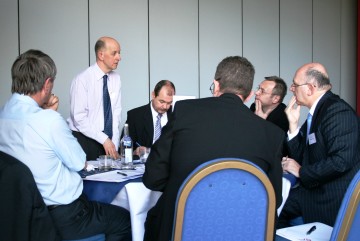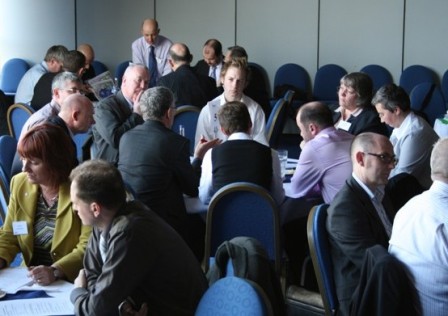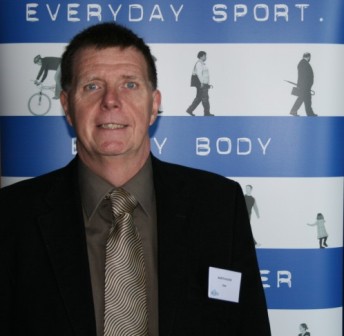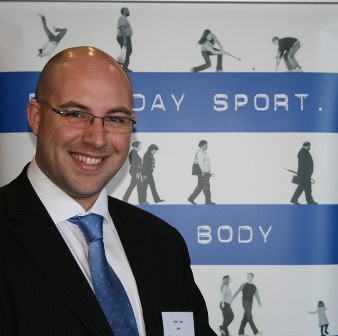The panorama afforded by the picture windows of the Gilpharm Stadium’s function suite would not make a tourism manager’s mouth water. Despite nestling in the West Yorkshire Pennines, Huddersfield is not a pretty town. Sprawling, busy and prosperous it may be but destined for the lid of a chocolate box it is not. Better descriptors are ‘real’, ‘workmanlike’ and even ‘sturdy’.
And the people who had made their way to the Sporta seminar ‘World Class Leisure and Cultural Services – Where Next?’, hosted at ‘the Gilpharm’ and promoted by Sport England and ISPAL, seemed to share some of the host town’s attributes. The more than fifty-strong audience all had a no-nonsense air and without doubt their metaphorical sleeves were rolled up; much like the Sport and Recreation Trusts Association (Sporta) itself, they wanted to get some work done. Sporta set their stall out as “the major organisation representing cultural and leisure trusts in the United Kingdom” and, with a membership open only to non-profit-distributing organisations that manage cultural and leisure facilities, their members “have a combined annual turnover in excess of £525 million, have over 205 million customers visiting their facilities each year and employ over 25,000 full-time employees”. And, despite operating over 800 individual sites, they keep their light under a bushel and quietly get on with the networking, updating and training work that this seminar represented.
This morning Sporta members from the North West, Yorkshire and East Midlands regions were joined by colleagues from the local authority and private sectors, and, with the event being chaired by that epitome of Yorkshire straightforwardness, Ian Kendall, who sits on the boards of both Sporta and ISPAL, it was no surprise to find the first speaker up and delivering bang on time.
Alex Bielecki had been asked to stand in for an ailing Sport England colleague and was briefed to update the seminar on the intricacies and opportunities of the Active England survey. The survey itself is now being updated with the additional cultural activities of using public libraries, visiting museums and galleries, and ‘engagement in the arts’. While the headline data from the survey has something of the ‘stating the obvious’ about it with participation in active recreation “dropping with age” and “women doing less than men”, it doesn’t take long before the scope and detail become apparent and, for anybody in the leisure business, the fun begins. Sport England have worked with a company called Experian to develop a market segmentation tool that acts as a predictor of participation and, combined with GIS capability, enables the curious or the commercially minded to identify how many of the nineteen identified demographic categories live in which parts of a facility’s catchment area. And they are giving it away for free.
Also dispensing valuable information freely was Andy Farr, director of consulting at PMP, who gave the results of a survey of fifteen trusts operating in the North West. The survey involved both the trusts and the authorities that host them but, while fourteen of the fifteen trusts responded, only eleven of their council colleagues did. This did not stop Andy’s presentation providing a fascinating insight into the threats and opportunities perceived by a major delivery sector of the leisure. Headline findings include: trusts should not be set up if tax savings are the fundamental rationale; clear communication between the trust and its council is key; and the trust board needs a balance of business and leisure skills, knowledge and experience.
The eponymous leader of Roger Pontefract and Associates then spoke about ‘commissioning’. It seems that the commissioning process requires needs assessment, user engagement, resources allocation and service design, all tricks that those who work in the public sector will want to master. Roger gave a comprehensive account of where commissioning is going to take the public sector, the levels at which it can happen, what makes it significant (the CAA – the comprehensive area assessment – featured strongly here) and some of the questions that predicate its use. Despite his assurances that we are only at the start of a debate on commissioning, it was hard to avoid the feeling that the debate was being held elsewhere, perhaps in the NHS, and that local authority sport and leisure had best get its skates on and get to grips with this complex area. One sentence in particular struck home: apparently it has been shown that “if more organisations deliver public services they improve more quickly”. Change is set to sweep through the public sector and the “need to improve efficiency by transforming the delivery of services”* with a greater emphasis on collaboration across silos and administrative boundaries is imminent.
Mr Pontefract did his best to counter any sense of panic growing in the room but Chair Kendall had no compunction whatsoever about putting the wind up everyone as he introduced the final speaker, Martyn Allison of the Improvement and Development Agency (IDeA). Anyone who has met Martyn or read TLR’s in-depth interview with him [see TLR’s December issue] would agree that he is a lovely chap. However, he is also something of a storm crow in the culture sector, a perennial harbinger of what the chair called “yet another brave new world”.
The scariest thing for everyone in the room and anyone in the sector not present is that Martyn agreed with Ian. After praise for everyone’s efforts in completing what should have been a ten-year journey in three years, he then likened the cultural sector to a trailing runner who had worked their way back into the pack, “because that is when you are at your most vulnerable”. Apparently “the improvement world is changing” and there isn’t going to be a few laps while we get our breath back. Silos are a thing of the past, local democracy and accountability is in, and strategic regulation through the CAA is on the way. Thankfully the work to create data sets, as represented by Active England and trusts surveys, has given the sector a base it didn’t have five years ago. However, there is still an imperative for the sector to improve the way we address under-performance, our regional support structures, how we share knowledge and the whole area of leadership and workforce development. And at some point we are all going to have to care about the “health of the herd” while ensuring we are “supporting the weak”. The test is no longer, “Is this working in this council?” but, “Is this working in this place?” Or at least that’s how the CAA will it. Whether generations of managers recruited from the ranks of sports people will grasp the concept of helping the downtrodden is debatable but, like the debates that raged around this event’s workshop tables as the listening stopped and the learning began, it will be worth watching.
Huddersfield was the birthplace of Rugby League, a byword for schism. According to the speakers at the Gilpharm Stadium, the sport, leisure and cultural sector is faced with the need to mend schisms and collaborate. Sporta’s commitment to bringing people together to debate and network is clear from this excellent event but is that common across the profession or will the silo-builders survive this latest brave new world?
Mick Owen is managing editor of The Leisure Review
*Commissioning in the Sport, Leisure & Cultural Sector: A guide for local government, February 2008, is available from Sport England.
Andy Farr has agreed to provide an article on the trusts report for The Leisure Review which we will carry at the earliest opportunity.
